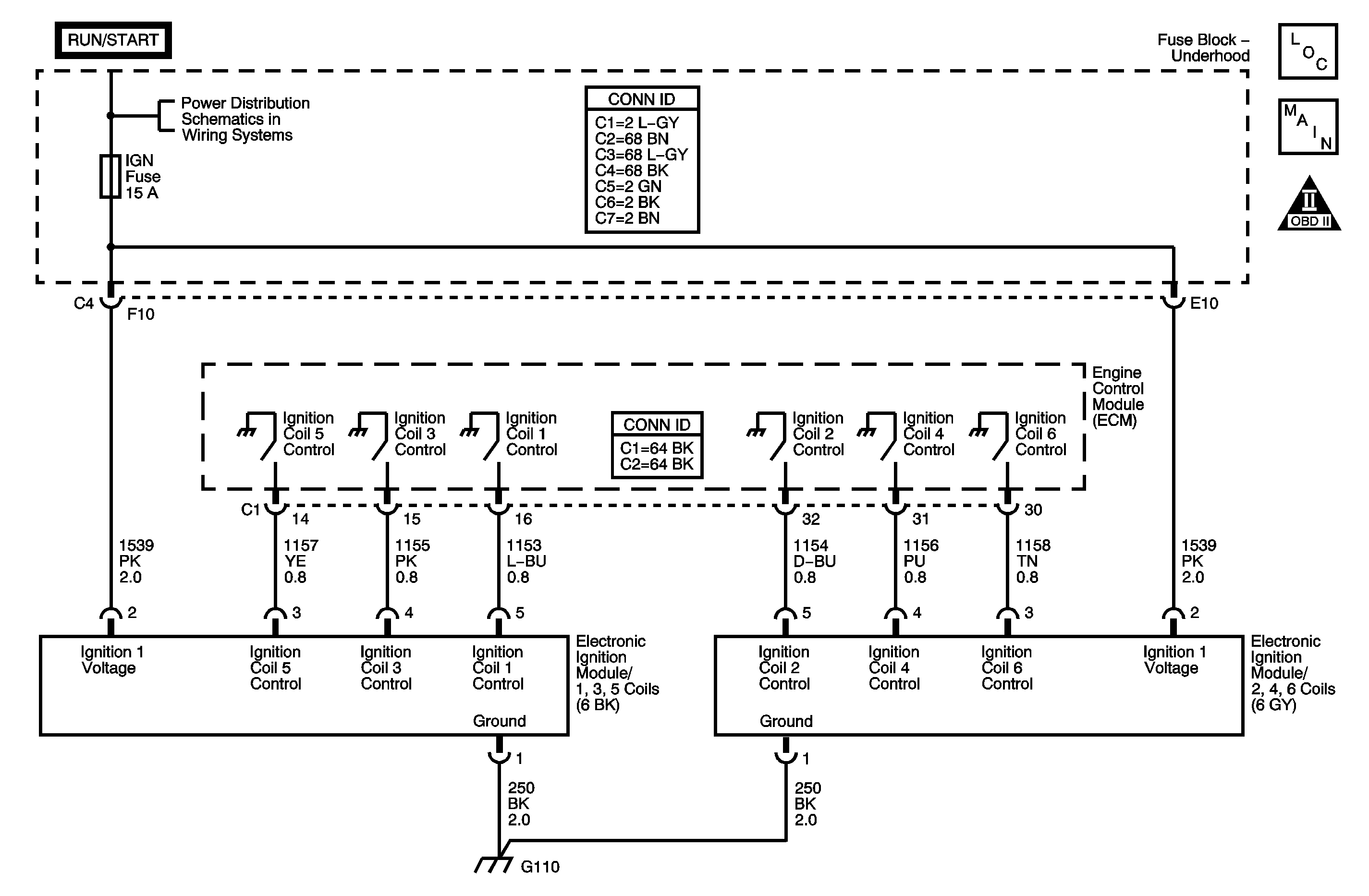
Circuit Description
The ignition system uses a ignition control module (ICM) for each bank. The ICMs consist of a controller and ignition coils. The ICMs are mounted in the center of each camshaft cover with short boots connecting the coils to the spark plugs. The engine control module (ECM) primarily uses engine speed and position information from the crankshaft (CKP) and camshaft position (CMP) sensors to control the sequence, dwell, and timing of the spark. The ECM can command each ignition coil ON/OFF by grounding the control circuit of the ignition coil. The control circuits are pulse width modulated (PWM) in order to precisely control the spark events.
Step | Action | Values | Yes | No | ||||||
|---|---|---|---|---|---|---|---|---|---|---|
Schematic Reference: Engine Controls Schematics Connector End View Reference: Engine Control Module Connector End Views or Engine Controls Connector End Views | ||||||||||
1 | Did you perform the Diagnostic System Check-Engine Controls? | -- | Go to Step 2 | |||||||
2 | Attempt to start the engine. Does the engine start and idle? | -- | Go to Step 3 | Go to Step 4 | ||||||
3 |
Does the misfire counters indicate misfires for one cylinder? | -- | Go to Step 8 | Go to Step 4 | ||||||
4 |
Does the test lamp illuminate? | -- | Go to Step 5 | Go to Step 15 | ||||||
5 | Connect a test lamp from the ignition voltage circuit to the ground circuit of the ICM. Does the test lamp illuminate? | -- | Go to Step 6 | Go to Step 16 | ||||||
6 |
Is the resistance less than the specified value? | 3 ohms | Go to Step 7 | Go to Step 17 | ||||||
7 | Measure the resistance of ground circuit of the ICM from the harness connector of the ICM to a good ground with a DMM. Is the resistance less than the specified value? | 3 ohms | Go to Step 13 | Go to Step 18 | ||||||
8 |
Important: If using a different test lamp, the bulb resistance needs to be 4 ohms or less. Does the test lamp flash? | -- | Go to Step 10 | Go to Step 9 | ||||||
9 | Does the test lamp remain ON? | -- | Go to Step 11 | Go to Step 12 | ||||||
10 |
Does the test lamp illuminate with same brightness for both circuits? | -- | Go to Step 13 | Go to Step 12 | ||||||
11 | Test the control circuit of the inoperative ignition coil for a short to ground. Refer to Circuit Testing and Wiring Repairs in Wiring Systems. Did you find and correct the condition? | -- | Go to Step 21 | Go to Step 14 | ||||||
12 | Test the control circuit of the inoperative ignition coil for one of the following conditions:
Refer to Circuit Testing and Wiring Repairs in Wiring Systems. Did you find and correct the condition? | -- | Go to Step 21 | Go to Step 14 | ||||||
13 | Test for shorted terminals or a poor connection at the ICM. Refer to Testing for Intermittent Conditions and Poor Connections and Connector Repairs in Wiring Systems. Did you find and correct the condition? | -- | Go to Step 21 | Go to Step 19 | ||||||
14 | Test for shorted terminals or a poor connection at the engine control module (ECM). Refer to Testing for Intermittent Conditions and Poor Connections and Connector Repairs in Wiring Systems. Did you find and correct the condition? | -- | Go to Step 21 | Go to Step 20 | ||||||
15 | Repair an open or a short to ground in the ignition voltage circuit of the ICM. Refer to Wiring Repairs in Wiring Systems. Did you complete the repair? | -- | Go to Step 21 | -- | ||||||
16 | Repair an open in the ground circuit of the ICM. Refer to Wiring Repairs in Wiring Systems. Did you complete the repair? | -- | Go to Step 21 | -- | ||||||
17 | Repair the high resistance in the ignition voltage circuit of the ICM. Refer to Wiring Repairs in Wiring Systems. Did you complete the repair? | -- | Go to Step 21 | -- | ||||||
18 | Repair the high resistance in the ground circuit of the ICM. Refer to Wiring Repairs in Wiring Systems. Did you complete the repair? | -- | Go to Step 21 | -- | ||||||
19 | Replace the coil assembly. Refer to Ignition Control Module Replacement - Bank 1 or Ignition Control Module Replacement - Bank 2 . Did you complete the replacement? | -- | Go to Step 21 | -- | ||||||
20 | Replace the ECM. Refer to Engine Control Module Replacement . Did you complete the replacement? | -- | Go to Step 21 | -- | ||||||
21 |
Does the vehicle operate normally? | -- | System OK | Go to Step 2 | ||||||
